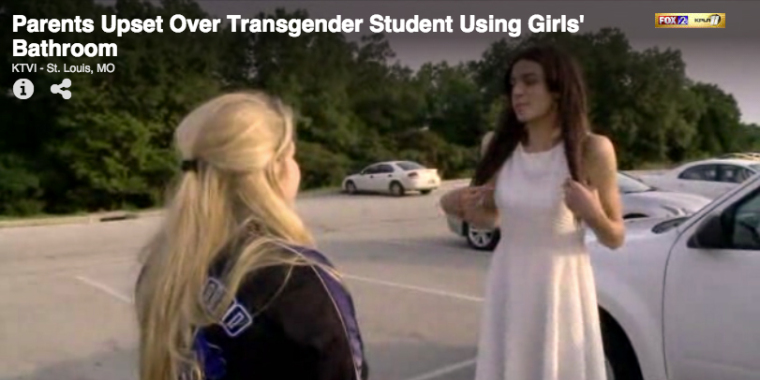Transgender bathrooms violate children's privacy, group charges

LE ROY, N.Y. (Christian Examiner) – A New York school has been told that allowing a biologically female student who self identifies as male to use restrooms and locker rooms designed for males is causing the other students to go to lengths to protect their own privacy.
Alliance Defending Freedom (ADF) has sent a demand letter to the members of the board, the superintendent, and the principal of Le Roy Jr.-Sr. High School requesting a transgender student no longer be allowed access to the boys' locker rooms and restrooms.
"Due to the concern of members of your school district, we are aware that Le Roy Jr.-Sr. High School is currently permitting a student who is biologically a female, but self-identifies as a male, to use restrooms and locker rooms designated for use by male students," said the Oct. 30 letter.
No child should be forced into an intimate setting – like a bathroom or a locker room – with a child of the opposite sex.
"This practice has made multiple male students very uncomfortable and has caused them to modify their daily activities to try to avoid sharing private facilities with a classmate who is a biological female," the letter continued. "After you review this letter, we hope that you will remedy this situation in a way that respects all students' rights of privacy."
ADF, which describes itself as an alliance-building, non-profit legal organization that advocates for the right of people to freely live out their faith, wants Le Roy and other schools to understand schools are not legally required to allow transgender students to access bathrooms and locker rooms other than those dictated by their biological sex.
In fact, doing so presents a considerable risk to the privacy and safety of the children, ADF argues.
"Protecting students from inappropriate exposure to the opposite sex is not only perfectly legal, it's a school district's duty," said ADF Legal Counsel Matt Sharp on the organization's website. "Letting boys into girls' locker rooms and restrooms is an invasion of privacy and a threat to student safety."
INVASION OF PRIVACY
The ADF letter, which was sent to schools around the nation last Dec., lays out the legal reasons why schools that deny transgender students access to bathrooms and locker rooms of the opposite sex are not violating the students' Title IX rights. The U.S. Department of Justice defines Title IX as a federal law that prohibits discrimination on the basis of sex in any federally funded education program or activity.
In one case cited in the letter, a Virginia court dismissed a Title IX claim in Sept. by a transgender student allowed to use the boys' locker room for seven weeks before parents and students convinced the school board to require children to use facilities based on biological sex.
The letter quoted the ruling as saying, "Not only is bodily privacy a constitutional right, the need for privacy is even more pronounced in the state educational system. The students are almost all minors, and public school education is a protective environment."
The ADF letter told the Le Roy school board and supervisors, "Federal caselaw thus explicitly permits school districts to regulate access to restroom and locker room facilities based upon students' sex without violating a transgender student's rights under Title IX."
It can be uncomfortable and unsafe for children to be forced to use facilities with children of the opposite sex.
"We're involved in several dozen school districts where we are helping out either the school district, the school board seeking more advice or parents wanting to provide information to school boards," Sharp said, according to the San Francisco Chronicle. The paper added the superintendent and principal have not yet responded to requests for comment.
THREAT TO SAFETY
ADF Senior Legal Counsel Jeremy Tedesco says the model policy protects children's, parents' and schools' rights while giving transgender students satisfactory accommodations. "Schools can accommodate a small number of students that have different needs without compromising the rights of other children and their parents," Tedesco said.
ADF also provided the school with a model policy it endorses regarding student physical privacy. It is willing to assist in defending the policy in court, potentially for free, should school districts that adopt it be challenged.
The policy allows children who request greater privacy to have access to single-use or unisex bathrooms or to staff bathrooms as appropriate, while making clear that "student restrooms, locker rooms, and showers that are designated for one [biological] sex shall only be used by members of that sex."
Tedesco underscores the importance of protecting children. "No child should be forced into an intimate setting – like a bathroom or a locker room – with a child of the opposite sex."
ADF acknowledges the importance of biological sex in managing public space. "In this context," says the letter to Le Roy, "protecting every student's privacy and safety is at a premium. Allowing students to access restroom and locker room facilities dedicated to the opposite sex accomplishes neither goal."